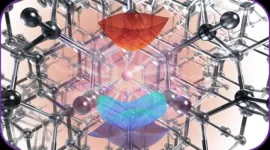(Press-News.org) In El Salvador, preference for cash and privacy fears deterred the widespread adoption of Bitcoin as an everyday currency, researchers report. The findings suggest that policies incentivizing cryptocurrency adoption as legal tender will likely fail unless populations are financially literate and already trust digital currencies. The introduction of digital currencies is one of the most important developments in monetary economics in the last decade. Unlike traditional digital currencies, which rely on central authorities such as governments or banks governed by regulations to mediate security and transactions, cryptocurrencies like Bitcoin use sophisticated cryptography and a decentralized network to ensure verifiable transactions. It’s argued that cryptocurrency may offer solutions for the unbanked or those reliant on remittances. However, cryptocurrencies have yet to be widely adopted for financial transactions, and the barriers that have kept them from becoming mainstream mediums of exchange aren’t fully understood. Here, Fernando Alvarez and colleagues leverage a unique natural experiment to evaluate these questions – the adoption of Bitcoin as a legal tender in El Salvador. In 2021, the Salvadorian government formally recognized bitcoin as a legal tender and made it law that bitcoin must be accepted as a means of payment for taxes and debts. The government required all businesses to accept bitcoin as a medium of exchange. To facilitate this, the Salvadorian government launched the app “Chivo Wallet” to allow users to digitally trade and exchange both Bitcoins and US dollars. Alvarez et al. developed a nationally representative, face-to-face survey of 1,800 households across El Salvador and analyzed data encompassing all transactions made over the Chivo Wallet. The authors found that digital payments and Bitcoin use have been generally low and have declined since its introduction as legal tender, despite the government’s efforts to incentivize its use. According to the findings, Salvadorians prefer tangible cash and had concerns about Bitcoin’s privacy and transparency, which is notable given that these are two areas decentralized cryptocurrencies aim to address. Both factors impeded Bitcoin’s widespread adoption by El Salvador’s population at large. What’s more, the authors' survey highlighted that Bitcoin was most used by the already wealthy, financially literate and banked, which starkly contrasts with the recurrent hypothesis that the use of cryptocurrencies may help the poor and unbanked the most.
END
Can cryptocurrencies be legal tender? A case study from El Salvador
2023-12-21
ELSE PRESS RELEASES FROM THIS DATE:
Researchers map how measles virus spreads in human brain
2023-12-21
ROCHESTER, Minn. — Mayo Clinic researchers mapped how the measles virus mutated and spread in the brain of a person who succumbed to a rare, lethal brain disease. New cases of this disease, which is a complication of the measles virus, may occur as measles reemerges among the unvaccinated, say researchers.
Using the latest tools in genetic sequencing, researchers at Mayo Clinic reconstructed how a collective of viral genomes colonized a human brain. The virus acquired distinct mutations that drove the spread of the virus from the frontal cortex outward.
"Our study provides compelling data that ...
Organic compounds in asteroids formed in colder regions of space: study
2023-12-21
Analysis of organic compounds – called polycyclic aromatic hydrocarbons (PAHs) – extracted from the Ryugu asteroid and Murchison meteorite has found that certain PAHs likely formed in the cold areas of space between stars rather than in hot regions near stars as was previously thought. The findings open new possibilities for studying life beyond Earth and the chemistry of objects in space.
The only Australian members of an international research team, scientists from Curtin’s WA-Organic ...
Advanced computational tool for understanding quantum materials
2023-12-21
Researchers at the University of Chicago’s Pritzker School of Molecular Engineering (PME), Argonne National Laboratory, and the University of Modena and Reggio Emilia have developed a new computational tool to describe how the atoms within quantum materials behave when they absorb and emit light. The tool will be released as part of the open-source software package WEST, developed within the Midwest Integrated Center for Computational Materials (MICCoM) by a team led by Prof. Marco ...
Role of enzyme SMYD3 clarified in prostate cancer progression
2023-12-21
Prostate cancer is the most common cancer in men other than skin cancer, and more than 288,000 new cases are diagnosed every year, according to the American Cancer Society. The disease’s fatality rate has decreased by more than half since the 1990s, but there is still room for progress—especially in treating or preventing advanced, metastatic disease, which is much more likely to be fatal.
A new paper published in Science Advances clarifies how an enzyme called SMYD3 may be involved in prostate ...
Professor Vladimir A. Botchkarev, Boston University School of Medicine, receives Skin Ageing & Challenges Best Scientific Award 2023
2023-12-21
The Skin Ageing & Challenges 2023 conference, held in November 2023 in Lisbon, has recognized the outstanding contributions of Prof. Vladimir A. Botchkarev, a distinguished Professor of Dermatology and Co-Director at the Boston University Center for Aging Research, with the prestigious Skin Ageing & Challenges Best Scientific Award 2023. The award acknowledges Prof. Botchkarev's exceptional research in the field of skin biology and aging.
Prof. Botchkarev's award-winning work, titled "Skin Aging in Long-Lived Naked Mole-Rats: Mechanisms and Perspectives", delves into the complicated aging process of Naked Mole Rats' skin. His comprehensive ...
Save the date for the 11th World Congress on Targeting Microbiota 2024 – Revolutionizing Future Medicine
2023-12-21
Targeting Microbiota 2024: Vision, Strategies and Perspectives
The 11th Annual Congress of the International Society of Microbiota (ISM), Targeting Microbiota 2024, is scheduled on October 17-18, at Corinthia Palace Malta. Targeting Microbiota 2024 will not only present the latest advancements but also serve as a pivotal hub for sharing visionary strategies and perspectives that will redefine the landscape of medicine. The Congress promises an immersive experience, offering a dynamic platform for the exchange of ideas, insights, and the exploration of innovative approaches that will shape the future of medicine.
Save the date and ...
Location, location, location: The hidden power of intracellular neighborhoods
2023-12-21
Highlights
Messenger RNA (mRNA) is translated into proteins in the cytoplasm of cells. But rather than being a uniform “soup,” the cytoplasm is divided into multiple distinct compartments or regions.
Each region is largely responsible for translating functionally similar types of mRNA, a new MSK study finds. And the location of translation determines the amount of protein produced by the mRNA.
The movement of mRNA to specific regions is directed by their size and shape, as well as by RNA-binding protein partners.
The findings could help develop new approaches to increase ...
Better prosthetics: $3M to develop more natural robotic leg control
2023-12-21
Dec. 21, 2023
Contact: Nicole Casal Moore, 734-709-1651, ncmoore@umich.edu
Images and videos
Better prosthetics: $3M to develop more natural robotic leg control
An effort to create a control model that moves seamlessly between different activities like standing, walking and climbing stairs is renewed by the National Institutes of Health
ANN ARBOR—A smoother experience for robotic prosthetic leg users is the aim of a University of Michigan project that has received renewed support from the National Institutes of Health. The R01 grant ...
The Council of Medical Specialty Societies awards CHEST a $100,000 grant to improve diagnostic excellence in ILD
2023-12-21
Glenview, IL – The American College of Chest Physicians (CHEST) was awarded a $100,000 grant from the Council of Medical Specialty Societies (CMSS) to improve diagnostic excellence in interstitial lung disease (ILD).
The funded project, called, "'How We Do It': CHEST Experts Weigh In," aims to inform future best practices in reducing the time to diagnosis for ILDs. The activities in the series will prepare the learner to:
define symptoms and patient profiles associated with ILD;
recognize health inequities that may assist in the diagnosis of ILD;
identify the appropriate tests that may help validate a suspicion of ILD; ...
Center for BrainHealth investigates the impact of auditory beat stimulation on cognition
2023-12-21
Certain Frequencies Enhance Comprehension
New research conducted by the Center for BrainHealth at The University of Texas at Dallas investigates the impact of binaural beat (BB) on language skills. BB is a sound that occurs when two slightly mismatched pure tones are heard. There is a growing interest in using BB as a non-invasive neuromodulation to enhance cognitive performance.
The study, Neural consequences of binaural beat stimulation on auditory sentence comprehension: an EEG study, was recently published in Cerebral Cortex.
Led by researchers in the Speech, Language and Music (SLAM) Lab, this EEG ...



